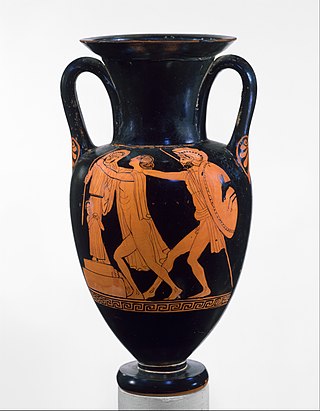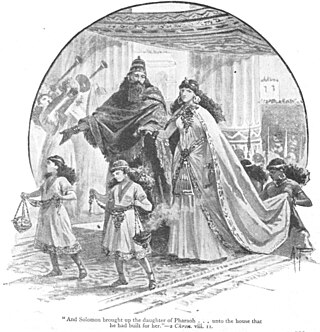Related Research Articles

Cassandra or Kassandra in Greek mythology was a Trojan priestess dedicated to the god Apollo and fated by him to utter true prophecies but never to be believed. In modern usage her name is employed as a rhetorical device to indicate a person whose accurate prophecies, generally of impending disaster, are not believed.

The Song of Roland is an 11th-century chanson de geste based on the deeds of the Frankish military leader Roland at the Battle of Roncevaux Pass in AD 778, during the reign of the Emperor Charlemagne. It is the oldest surviving major work of French literature. It exists in various manuscript versions, which testify to its enormous and enduring popularity in Medieval and Renaissance literature from the 12th to 16th centuries.

Uriah the Hittite is a minor figure in the Hebrew Bible, mentioned in the Books of Samuel, an elite soldier in the army of David, king of Israel and Judah, and the husband of Bathsheba, the daughter of Eliam. While Uriah was serving in David's army abroad, David, from the roof of his palace, looked down on his city and spied upon Bathsheba bathing in the privacy of her courtyard. Moved by lust at the sight of her, David called for Bathsheba to be brought to him and slept with her, impregnating her. In an effort to hide his misdeeds, David called Uriah home from war, hoping that he and Bathsheba would have sex and that he would be able to pass the child off as belonging to Uriah. However, Uriah, being a disciplined soldier, refused to visit his wife. So David murdered him by proxy by ordering all of Uriah's comrades to abandon him in the midst of battle, so that he ended up getting killed by an opposing army. Following Uriah's death, David took Bathsheba as his eighth wife.

The Battle of Roncevaux Pass in 778 saw a large force of Basques ambush a part of Charlemagne's army in Roncevaux Pass, a high mountain pass in the Pyrenees on the present border between France and Spain, after his invasion of the Iberian Peninsula.

Psalm 89 is the 89th psalm of the Book of Psalms, beginning in English in the King James Version: "I will sing of the mercies of the LORD for ever". In the slightly different numbering system used in the Greek Septuagint and Latin Vulgate translations of the Bible, this psalm is Psalm 88. In Latin, it is known as "Misericordias Domini in aeternum cantabo". It is described as a maschil or "contemplation".

Oliver, sometimes referred to as Olivier de Vienne or de Gennes, is a legendary knight in the Matter of France chansons de geste, especially the French epic The Song of Roland. In the tradition, he was Roland's closest friend, advisor, confidant and brother-in-law to be, one of Charlemagne's twelve peers and brother of Aude, Roland's betrothed. He dies with Roland at the Battle of Roncevaux Pass. Some critics have linked his name to the olive tree, a biblical symbol of divine wisdom.

The Pharaoh's daughter is a figure in the Hebrew Bible who is described as marrying Solomon to cement a political alliance between the United Monarchy of Israel and Egypt.

Psalm 74 is the 74th psalm of the Book of Psalms, beginning in English in the King James Version: "O God, why hast thou cast us off for ever?". In the slightly different numbering system used in the Greek Septuagint and Latin Vulgate translations of the Bible, this psalm is Psalm 73. In Latin, it is known as "Ut quid Deus reppulisti in finem iratus". Subheaded a maschil or contemplation, and a community lament, it expresses the pleas of the Jewish community in the Babylonian captivity. It is attributed to Asaph.
Dirghatamas was an ancient Indian Brahmin sage well known for his philosophical verses in the Rigveda. He was the author of Suktas (hymns) 140 to 164 in the first mandala (section) of the Rigveda.
Coronation Ode, Op. 44 is a work composed by Edward Elgar for soprano, alto, tenor and bass soloists, chorus and orchestra, with words by A. C. Benson.
Charles Stuart, that man of blood was a phrase used by Independents, during the English Civil War to describe King Charles I.

The accession of the King of France to the royal throne was legitimized by a ceremony performed with the Crown of Charlemagne at the Reims Cathedral. In late medieval and early modern times, the new king did not need to be anointed in order to be recognized as French monarch but ascended upon the previous monarch's death with the proclamation "Le Roi est mort, vive le Roi!"

"I am the LORD thy God" is the opening phrase of the Ten Commandments, which are widely understood as moral imperatives by ancient legal historians and Jewish and Christian biblical scholars.
Marsile is a character in the French heroic poem The Song of Roland. He is the Muslim king of Arabs, conquering Saracens and of Saragossa. He first appears in Stanza 1, asking his barons for counsel because he is losing the war against Charlemagne. He readily accepts Blancandrin's proposal of surrender, and agrees to Ganelon's scheme after testing his worth and persuasion from his wife Bramimonde and his nobility (32–52). He takes part in the Battle of Roncevaux Pass, kills Bevon, Lord of Beaune and Dijon, Yvoire, Yvon and Gerald of Roussillon, before Roland cuts off Marsile's right hand and the head of his son, Jurfaleu the Blond, and Marsile is forced to flee (142) to Saragossa (187). Bound to his bed with his injuries, he summons help from Baligant (189), places Spain in Baligant's care (202), and later dies of his wounds, his army having been destroyed.

Psalm 22 of the Book of Psalms or My God, my God, why hast thou forsaken me? is a psalm in the Bible.

Psalm 60 is the 60th psalm of the Book of Psalms, beginning in English in the King James Version: "O God, thou hast cast us off, thou hast scattered us". In the slightly different numbering system of the Greek Septuagint version of the Bible and the Latin Vulgate, this psalm is Psalm 59. In Latin, it is known as "Deus reppulisti nos et destruxisti nos". It is addressed "to the chief Musician upon Shushan Eduth", referring to the title of a song, presumably identifying the intended melody, mentioned only here and in Psalm 80, and described as "a Michtam of David, when he strove with Aramnaharaim and with Aramzobah, when Joab returned, and smote of Edom in the valley of salt twelve thousand." The heading text in the Revised Standard Version and the New American Bible Revised Edition refers to Aram-Zobah, whereas in the New King James Version the reference is to Zobah. The psalm has been called a psalm of communal lament.

Psalm 80 is the 80th psalm of the Book of Psalms, beginning in English in the King James Version: "Give ear, O Shepherd of Israel, thou that leadest Joseph like a flock". In the slightly different numbering system used in the Greek Septuagint and Latin Vulgate translations of the Bible, this psalm is Psalm 79. In Latin, it is known as "Qui regis Israel intende". It is one of the 12 Psalms of Asaph. The New American Bible calls it "a prayer for Jerusalem". The Jerusalem Bible describes it as "a prayer for the restoration of Israel".

Rebecca appears in the Hebrew Bible as the wife of Isaac and the mother of Jacob and Esau. According to biblical tradition, Rebecca's father was Bethuel the Aramean from Paddan Aram, also called Aram-Naharaim. Rebecca's brother was Laban the Aramean, and she was the granddaughter of Milcah and Nahor, the brother of Abraham. Rebecca and Isaac were one of the four couples that some believe are buried in the Cave of the Patriarchs, the other three being Adam and Eve, Abraham and Sarah, and Jacob and Leah. Most scholars have considered Rebecca's historicity uncertain.

The Begatting of the President is a satirical album narrated by Orson Welles, summarising the presidency of Lyndon B. Johnson and the election of 1968, leading up to the election of Richard Nixon, delivered in the style of Biblical verse.

Shimei ben Gera is a Biblical figure from the Book of II Samuel and the Book of I Kings. He was from the tribe of Benjamin and was related to King Saul. II Samuel relates that when King David was fleeing from his son Absalom, Shimei cursed him as he passed through the village of Bahurim:
5. And when king David came to Bahurim, behold, there came out thence a man of the family of the house of Saul, whose name was Shimei, the son of Gera; he came out, and kept on cursing as he came. 6. And he cast stones at David, and at all the servants of king David; and all the people and all the mighty men were on his right hand and on his left. 7. And thus said Shimei when he cursed: 'Begone, begone, thou man of blood, and base fellow; 8. the Lord hath returned upon thee all the blood of the house of Saul, in whose stead thou hast reigned; and the Lord hath delivered the kingdom into the hand of Absalom thy son; and, behold, thou art taken in thine own mischief, because thou art a man of blood.'